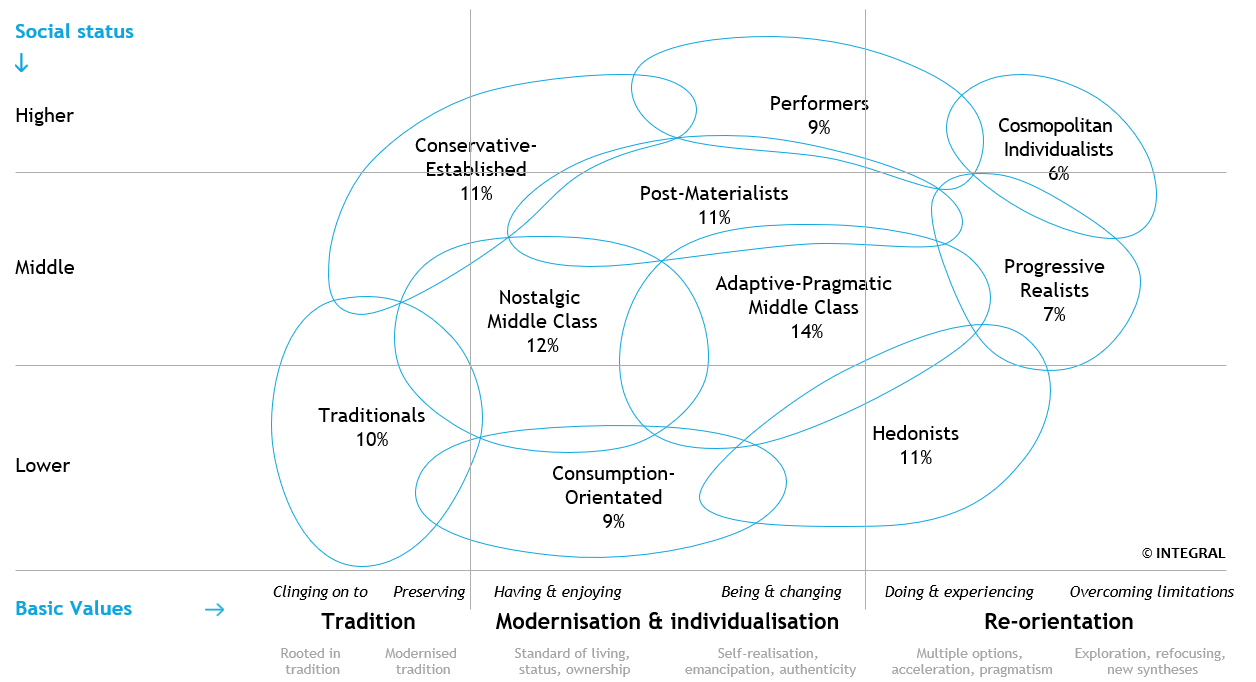
The Sinus-Milieus are a social model. They were developed by SINUS over 40 years ago and are considered the gold standard of target group segmentation. The Sinus Milieus group people with similar values and a comparable social situation into "groups of like-minded people". The transitions between the milieus are fluid. We call this the "uncertainty principle of everyday reality".
The Sinus models all have a very similar graphical structure ("potato graph"). The vertical axis shows the social situation (ranging from low to high) and the horizontal axis the value orientation (ranging from traditional to postmodern). The higher a milieu is located in this graph, the more upscale its education, income and occupational group; the further to the right it extends, the more modern in a sociocultural sense is the basic orientation of the respective milieu.

The Sinus-Milieus make it clear what moves the various lifeworlds in our society (values, life goals, lifestyles) - and how they can be moved (media use, communication preferences). They therefore offer marketing more information and better decision-making tools than conventional target group approaches. Products, brands, political parties, media, etc. can be positioned in the milieu map.
Sinus-Milieu models are available for Austria, Germany and Switzerland as well as over 50 other countries. The models are continuously adapted to the socio-cultural changes in the respective societies.
Extensive information from the creators, developers and users of the Sinus-Milieu model can be found in our basic manual „Praxis der Sinus-Milieus“.
Our information packages provide a comprehensive introduction to working with the Sinus-Milieus. Would you like to learn more about the Sinus-Milieus? Then contact our milieu experts.
The Sinus-Milieus are under constant development. The basis for this is the trend research of SINUS-Institut along with various SINUS studies on people’s lifeworlds.
The Sinus-Milieus are therefore not a ’one-off typology’ like many other models but rather an approach that has been established for decades, with great market penetration.
This is evidenced by the integration of the Sinus Milieus into the most important market media studies, consumer and TV audience panels in Germany and Austria.
The Sinus-Milieus are a hub for linking information on different topics from different sources, because the milieus tick the same way, whatever the research design. For example, the media behavior of the Expeditives from a representative survey can be combined with the basic travel orientations of this future milieu, which were researched in focus groups.
The approach is used by leading brand manufacturers and service companies for strategic marketing, product development and communications, and by political parties, ministries, trade unions, churches and associations. Large media companies have been working with it for years, as have advertising and media agencies.
As Sinus-Milieu studies are published continuously, you learn more and more about your target groups. This wealth of experience can therefore be built on – often cost-neutrally. In other words, the existence of many pre-existing verified findings dispenses with the need to collect and analyze data from scratch, especially with regard to communication strategies and media usage (Milieu-specific touchpoints).
The Sinus Milieus approach allows our customers to better understand the modern sets of values, and the relevant trends of today and tomorrow, and to target their target groups even more precisely – not only in German-speaking countries, but now in over 50 countries.
The areas of application for the Sinus-Milieus are wide-ranging. In addition to applications in politics, the Church, journalism or education, there is hardly a market category in classic marketing research for which the Sinus-Milieus have not been used. They enable a differentiated description of customer and buyer groups, the targeted positioning of products and services, the definition of market segments for new products and relaunches, the detection of market niches, the efficient addressing of buyer potential, and, last but not least, the early detection and localization of new motivations and constitutions.
The Sinus-Milieus can be used in many ways:
An introduction to working with the Sinus-Milieus is provided by our information packages, workshops as well as combinations.
You can also have us collect new and targeted target group data at any time. If you need quick answers to a few questions, we recommend a representative short survey (INTEGRAL Onlinebus). Of course, we also offer more extensive customized market and social research studies.
For more information on the Sinus-Milieus, we recommend the handbook “Praxis der Sinus-Milieus” (“Sinus-Milieus in Practice”).
There are considerable differences between the German and Austrian milieu landscapes.
Although the coordinate system and the designations of some milieus coincide with the German milieu system, there are some substantial differences to be noted: Austrian society is politically and socially more conservative than German society.
Austrian society's understanding of values is more characterized by hedonism, less by structures, rules and discipline than that of German society. This is a general tendency, but it also has a specific impact on individual milieus - for example, the Adaptive-Pragmatic Middle Class in Austria are much more focused on enjoyment and fun. The Cosmopolitan Individualists are similar to the Expeditives in Germany in various respects, but it is more hedonistic and more focused on individuality and independence, and at the same time less cosmopolitan.
No! Due to the clear differences in the milieu landscapes (see also point 4), it is not advisable to simply apply the German milieu model to Austria.
For studies conducted in Germany and Austria where cross-country comparisons are desired, we recommend using the international system of Meta-Milieus.
The Meta Milieus provide a cross-national target group model based on milieus for international marketing. The Meta Milieus are currently available for 48 countries. They can be developed for other countries at any time. We distinguish between the developed markets (established markets) and the emerging countries (emerging markets). For each of these economic spheres, there is an independent model with nine milieus each. They describe the lifeworlds of people in a holistic and cross-nationally comparable way – without ignoring local characteristics.